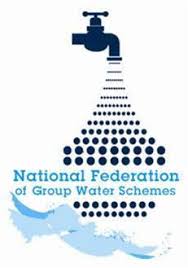The group water scheme sector has always had a close relationship with the farming community.
Indeed, one of the main motivating factors for the establishment of group water schemes (GWS) was to provide piped water for use on farms.
The co-operative ethos is another shared trait, with the GWS sector hugely driven by the concept of community-ownership and the ‘meitheal’ mindset of communities helping each other for the betterment of everyone.
In recent years, the National Federation of Group Water Schemes (NFGWS) has led a number of extensive source protection pilot projects that have been focused on improving water quality within the source catchments of group water schemes around the country.
Catchment analysis has reflected national trends, showing agriculture as the main pressure on water quality, with pesticides and excess nutrients and unrestricted livestock access to water courses being the main issues.
The recently completed NFGWS Source Protection Pilot Project worked with farmers in counties Roscommon and Monaghan to install mitigation measures and change farm practices, all with the goal of improving the quality of group water scheme sources.
It saw over 20km of fencing installed along watercourses and around vulnerable features. Some 10.8ha of vegetative buffer zones were created and more than 4km of multi-species hedgerow planted.
Farmers voluntarily gave up areas of their land to create said buffer zones, with many going beyond regulatory requirements.
The project relied on the concept of ‘trust’. The trust group water scheme members have in their representatives was the key to achieving such levels of engagement and agreement to introduce physical measures.
The local knowledge held by GWS personnel and farmers was also essential to the project’s success — both in terms of ground-proofing desk-based science and their knowledge of the social dynamics within a locality.
‘Let it Bee’
The karst landscape of Co. Roscommon means that it is difficult to introduce particularly targeted measures to prevent loss of pesticides and nutrients to water.
One drop of pesticide can contaminate up to 30km of a small stream, so widespread behavioural change was needed from farmers and homeowners alike.
As part of this effort, an initiative was devised called ‘Let it Bee’. It enabled 17 farming families in Roscommon GWS source catchments to become beekeepers, providing them with honeybees, hives, suits and the necessary equipment, as well as training and mentoring.
It encouraged them to act as ambassadors for biodiversity enhancement and educate their community on the dangers of pesticides to water quality and the wider environment.
Bees can travel a 5km radius from their hive to forage for food. Reducing or eliminating pesticide usage in the area reduces the risk of pesticide contamination within the GWS sources and allows additional pollinator food sources to flourish.
Let it Bee would go on to win the European Landowners’ Organisation’s European Bee Award 2021 and has since expanded to other counties, with the addition of new measures to help threatened wild bee species.
Well-being impact
The Irish Research Council is funding ongoing research by the Royal College of Surgeons in Ireland (RCSI) into the well-being impact of the initiative on those who have participated and others impacted in the local community.
The trust concept and the ethos of working in partnership with farmers was reflected in some of the comments from those interviewed.
“Well, at first, I was like ‘’What’s going on, who is this shower?’’ But when I saw my neighbours getting involved, I knew then that I’d take part too,” one farmer said.
“It was farmer-led. We weren’t bulldozed into it. You were explained what it was about and we got to make our own mind up about what we wanted,” another said.
A number of farmers spoke about how the experience has brought them joy.
One farmer said: “My life has changed a lot since we got the bees. I’m far happier, the bees are like a little society, a little family. You have a huge responsibility in taking care of this little family.”
Another explained: “I have been a farmer all of my life and they have got me closer to nature. We have planted more flowers here, which we didn’t have. We’ve let a place go wild out the back. The bees gave me a new perspective on life.”
The approach of the overall source protection project was to give farmers and others tangible actions that would encourage understanding of sometimes overwhelming concepts.
Along with beehives, wild bee hotels were given to other GWS members and over 8,000 trees were given to primary schoolchildren in Roscommon alone.
The success of the strategy was reflected in the comments of another farmer, who said:
“When you turn on the news you’ll hear all about climate change, you will hear all about biodiversity loss, about species dying out.
“This is someone else’s news but if you bring all the things — the bee hives, the bee hotels, the trees at the schools — to a local level, it’s not just the climate that has to change, we have to change too.”
Integrated source protection planning will continue to be a major focus for the group water scheme sector. It is absolutely essential that improvements to water quality are achieved throughout Ireland and, in doing so, it will bring about a host of other environmental benefits.
Any success will rely on the actions of the farming community, and by working together with local group water schemes and other like-minded people, a more sustainable future is within reach.
The NFGWS is celebrating Rural Water Week this week, which ends tomorrow (September 8). Follow the NFGWS on all social media channels to keep abreast of everything that’s happening.
Visit the NFGWS website here.

